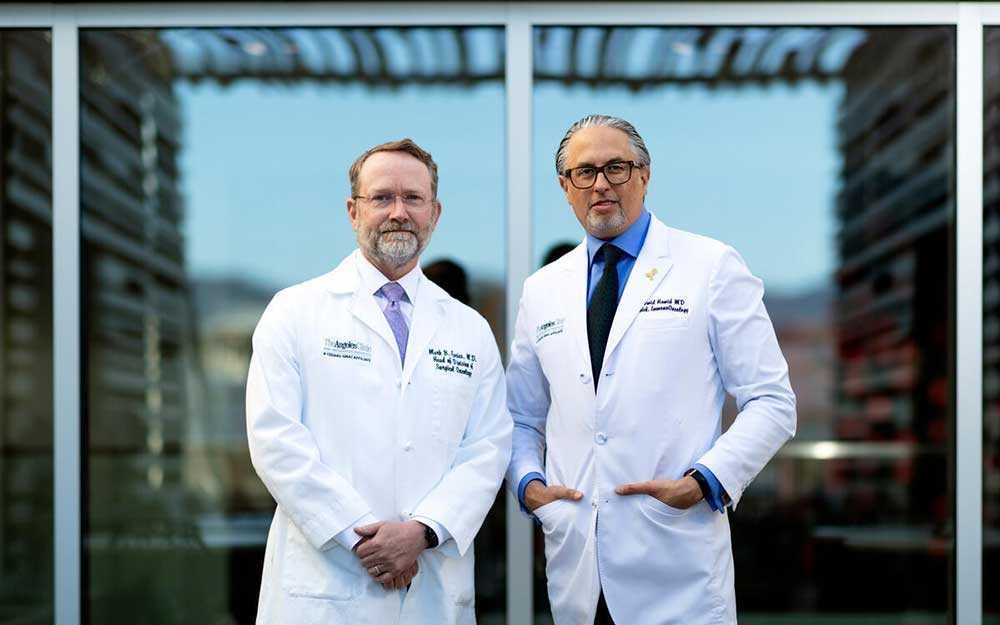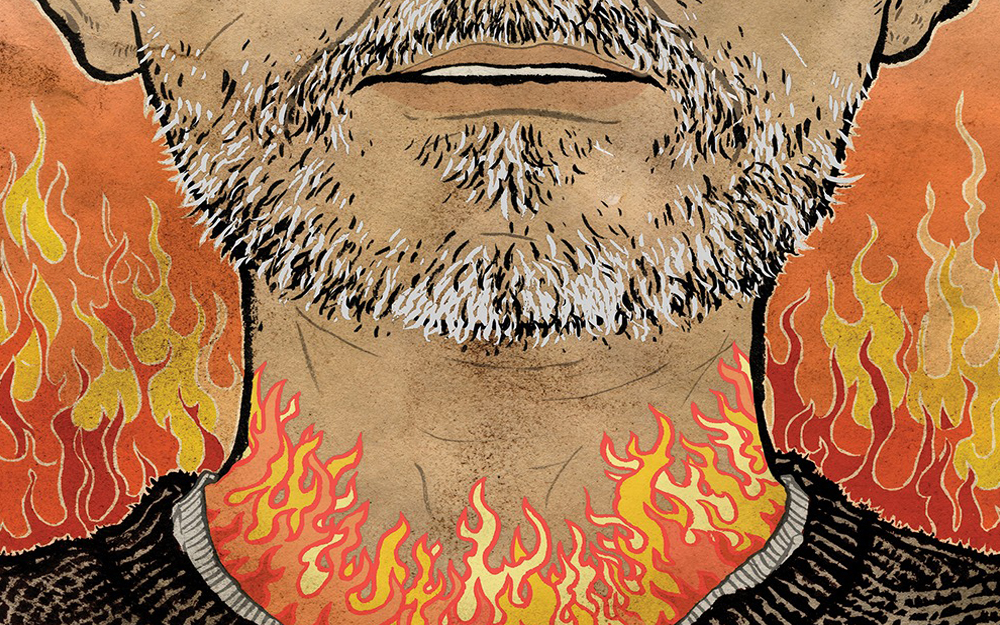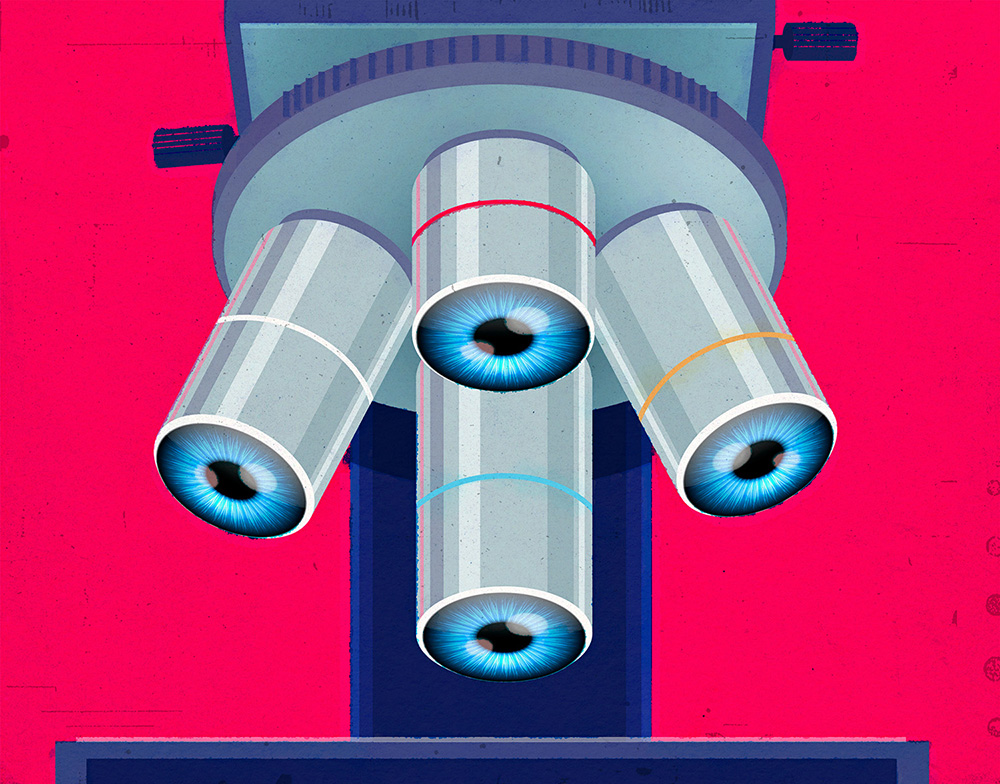Researchers Look to Fasting as a Next Step in Cancer Treatment
Date
January 5, 2024
Credits

Date
January 5, 2024
Credits
Medical providers featured in this article
In Brief
{{cta-block}}
Fasting and dietary protocols designed to starve the body’s cells of their main energy source, glucose, have been gaining attention over the past two decades after a spate of studies found an association between fasting and longevity. But the latest research suggests that patients with cancer may also experience gains from fasting, especially while undergoing treatment.
According to Stephen Freedland, MD, director of the Center for Integrated Research in Cancer and Lifestyle at Cedars-Sinai Cancer and associate director of Training and Education at the Samuel Oschin Comprehensive Cancer Center, fasting selectively targets cancer cells based on their vulnerabilities—just like chemotherapy. While healthy cells lie dormant during a fast (and shore up their defenses), cancer cells are already damaged, so they struggle to survive without nourishment.
“I liken it to bears and hummingbirds,” Freedland explained. “In the absence of food, bears hibernate. But hummingbirds, like tumor cells, can’t hibernate—and they’ll die without food.”
Now scientists and clinicians at Cedars-Sinai are exploring whether fasting diets, in conjunction with conventional cancer treatment, can help stall disease progression for even the most aggressive tumors, while reducing the toll on the body’s healthy, disease-fighting cells.
"People sometimes question how powerful a diet can be when you’re faced with an aggressive, life-threatening cancer. Yet, diet is one of the most powerful levers we have to manipulate our body’s physiology.”
Attacking the Toughest Tumors
When patients asked Jethro Hu, MD, co-director of Neuro-Oncology at Cedars-Sinai, whether dietary changes could stall disease progression, he used to tell them that evidence is limited. But over time, he began noticing that patients who adopted a ketogenic diet of their own accord sometimes fared better.
A ketogenic diet is metabolically similar to fasting: In both cases, your body breaks down fats for fuel. But cancer cells can’t adapt as easily.
“One of the first molecular differences between cancer and normal cells is a difference in metabolism, where cancer cells have a much higher glucose uptake than healthy cells,” Hu said. “If you limit circulating glucose, healthy cells can switch to an alternate fuel source: ketones.”
Cancer cells don’t have the ability to make that same metabolic switch.
Starving the body of glucose made sense in theory, and since many of Hu’s patients were already following ketogenic protocols, Hu and oncology dietitian LJ Amaral decided to launch a feasibility study, exploring the effects of the diet on patients with brain tumors.
“I wasn’t expecting much from the study, but shortly after starting the diet, patients reported dramatic improvement in symptoms like seizure, cognitive deficits and visual impairment,” Hu said. “One patient, who had lost the ability to read because of the location of his tumor, was able to read again within a few weeks of following the ketogenic diet.”
Emboldened by the striking findings, Hu and Amaral, along with Freedland, designed a clinical trial investigating the safety and efficacy of the dietary protocol, called DIET2TREAT. The multicenter, two-arm trial of 170 glioblastoma patients across five sites will pit a ketogenic diet against a control arm, both in conjunction with standard of care.
“If the results are positive, we have the potential to establish a new standard of care that can improve survival without the toxicity of traditional cancer therapies,” Hu said.
Targeting Toxicities
For decades, researchers have recognized the benefits of starving cancerous cells. Without nourishment to grow and thrive, cancer cells become more vulnerable to chemotherapy and targeted treatments. At the same time, normal cells become more dormant (heavy-duty hibernating), which helps protect them against the toxicities of treatments, including androgen deprivation therapy and even chemotherapy.
“For a long time, we thought of cancer as a genomic disease, and that drove the development of gene therapies,” Freedland says. “But cancer is also a metabolic disease that has unique metabolic needs, so it’s the perfect disease to combine Western gene-targeted therapies with dietary and lifestyle interventions.”
Studies show that fasting reduces insulin growth factor (IGF-1) levels, a marker for increased cancer risk, boosts normal cells’ defenses and enhances autophagy, our body’s cellular housekeeping mechanism. And according to pre-clinical findings from Stephen Pandol, MD, director of Basic and Translational Pancreas Research, fasting could play a role in preventing metastases to the liver.
Building on this research, Freedland and his colleagues launched a Phase II, multicenter randomized trial to uncover whether following a five-day per month plant-based diet for six months, in conjunction with intensified androgen deprivation therapy, can improve cancer control and reduce the negative metabolic and cardiovascular side effects of treatment for patients with metastatic prostate cancer. The diet (called the fasting mimicking diet) provides about 1,100 calories on day one, approximately 500 calories per day on days two through four and 800 calories on day five.
At the same time, Cedars-Sinai investigators, in collaboration with the University of Alabama at Birmingham, are embarking on one of the largest randomized controlled trials of time-restricted eating among patients with cancer in active treatment.
“What’s easy about time-restricted eating is that you’re only telling people when to eat, not what to eat,” says Jane Figueiredo, PhD, Director of Community and Population Health Research and professor of Medicine at Cedars-Sinai Cancer. “Our participants start eating within one to three hours of waking up and stop eating eight hours later, but they can eat whatever they want during that window.”
Within that framework, there’s evidence that time-restricted eating could help reduce treatment toxicities, and maybe even improve patient outcomes.
“Even if time-restricted eating does nothing more than help patients with cancer feel better during their cancer treatment, that’s a huge win,” says Figueiredo.
Empowering Patients
Patients are craving more control, and even the sickest patients who have the worst outcomes are hungry for guidance about diet, lifestyle and exercise. They want to know if there’s anything they can do to affect the course of their disease. And while fasting is not standard of care—more research needs to be done—it’s a simple tool that may markedly improve outcomes for a subset of patients with cancer.
“People sometimes question how powerful a diet can be when you’re faced with an aggressive, life-threatening cancer,” Hu said. “Yet, diet is one of the most powerful levers we have to manipulate our body’s physiology.”
Making dietary changes empowers patients, too, because it’s something they have control over when their world feels out of control.
For those who don’t want to fast, or who can’t, Cedars-Sinai experts are working to develop novel therapeutics that target cancer metabolism and mimic the effects of fasting. In the meantime, investigators such as Freedland are interested in exploring whether there’s a role for weight loss drugs like Ozempic in addressing cancer metabolism.
“Even if a fasting mimicking diet makes no difference at all, and I would be hard-pressed to believe that’s the case, just the perception that patients get an element of control back is immeasurable,” Freedland said. “I don’t think we can overestimate the psychological benefits of patients believing that they are a partner in this fight.”
In the Newsroom: An Updated Look at Prostate Cancer Disparities






